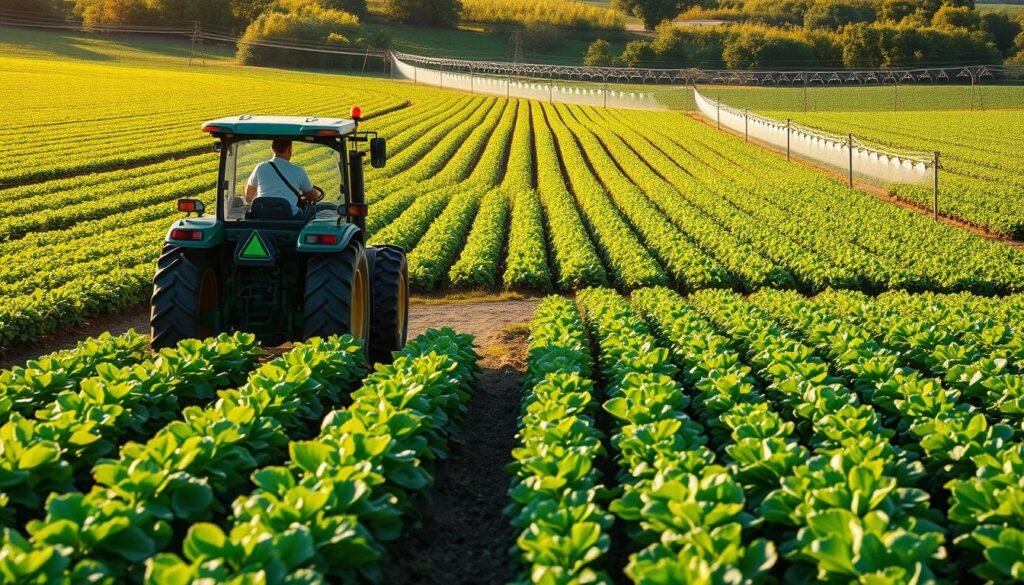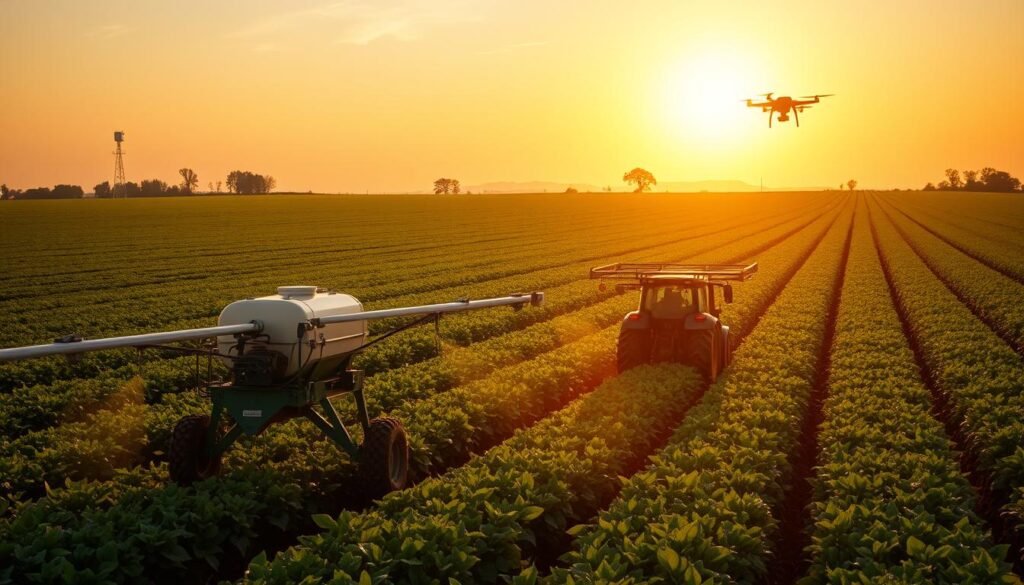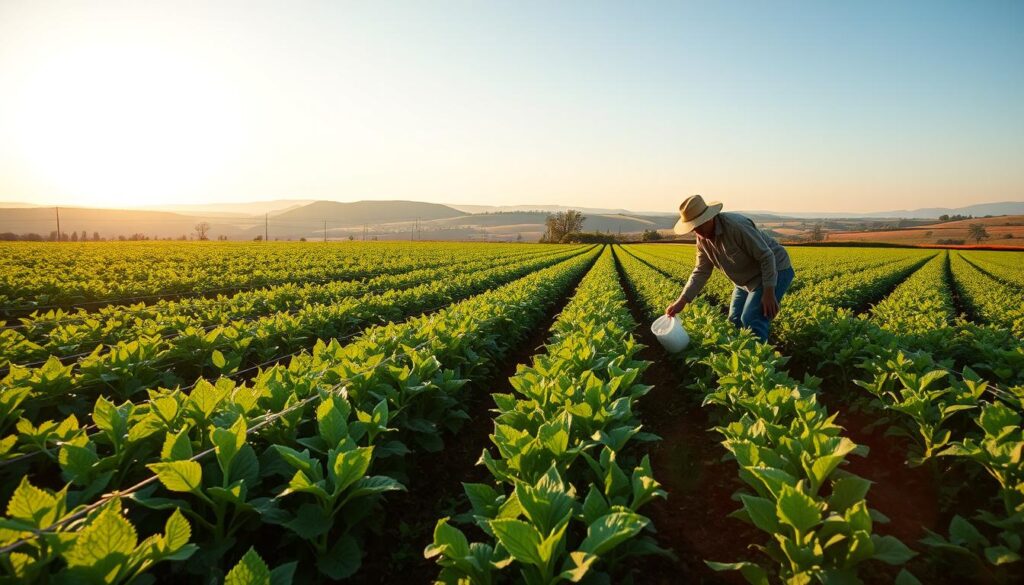Can farmers in Pakistan grow more crops and protect the environment? Yes, by using nitrogen fertilizer best practices. Nitrogen is key for plants, but using too much harms the earth.
The world’s population is growing fast. Farmers need to grow more food without hurting the planet. Eco-friendly nitrogen management is a good way to do this.
This article will talk about why sustainable nitrogen management is important. We’ll look at the problems with old ways and the good of new, green methods.
The Critical Role of Nitrogen in Agriculture
Nitrogen is very important in farming. It helps crops grow and keeps the environment safe. It’s a key part of amino acids, which are needed for plant growth.
Nitrogen’s Function in Plant Growth and Development
Nitrogen helps plants make chlorophyll. This lets them make food through photosynthesis. It also helps plants grow strong roots, stems, and leaves. With enough nitrogen, plants grow well and produce more.
Current Nitrogen Usage Patterns in Pakistan
In Pakistan, how much nitrogen farmers use changes a lot. Farmers often use nitrogen-based fertilizers without thinking about the soil or what the crops need. This makes the use of nitrogen not very good.
Regional Variations Across Pakistani Provinces
In places like Punjab and Sindh, how much nitrogen farmers use is different. This is because of the different crops and soil types. Knowing these differences helps use nitrogen better.
Seasonal Application Trends
How much nitrogen farmers use also changes with the seasons. Precision agriculture techniques help farmers use nitrogen better when crops are growing fast.
Challenges of Conventional Nitrogen Management in Pakistan
Pakistan’s farms face big problems with how they use nitrogen. Farmers use a lot of nitrogen to grow more crops. But this hurts the environment and the economy a lot.
Environmental Concerns of Excessive Nitrogen Application
Too much nitrogen harms the environment in many ways. It pollutes water and hurts plants and animals. It also makes the soil worse and less fertile over time.
Economic Implications of Nitrogen Mismanagement
Using nitrogen poorly costs farmers and the country money. It wastes resources and makes growing crops more expensive.
Impact on Small-Scale Pakistani Farmers
Small farmers are hit hard by bad nitrogen use. They don’t have much money or know how to use nitrogen well. This makes their crops smaller and their money less.
National Economic Consequences
The whole country loses money because of bad nitrogen use. The cost of nitrogen and the damage it does add up to big losses.
| Economic Indicator | Conventional Nitrogen Management | Sustainable Nitrogen Management |
|---|---|---|
| Cost of Nitrogen Fertilizers | High | Optimized |
| Environmental Damage | Significant | Reduced |
| Farmers’ Income | Variable | Stable |
Sustainable Nitrogen Management: Principles and Practices
The way we manage nitrogen is key to growing more food without harming the planet. This is especially important in Pakistan, where good nitrogen management can boost crops and protect the environment.
Core Principles of Nitrogen Sustainability
Good nitrogen management means using less and losing less to the air and water. We use green nitrogen management techniques to help crops grow better and keep the environment clean. This includes choosing the right fertilizer, applying it at the best time, and using low-carbon nitrogen solutions to cut down on greenhouse gases.
Balancing Productivity and Environmental Protection
It’s important to grow food and protect the environment at the same time. We do this by using nitrogen efficiency strategies that help crops grow well without wasting nitrogen. This way, farms can make more money and help the planet too.
Nitrogen Use Efficiency Metrics
It’s important to measure how well we use nitrogen. The Nitrogen Use Efficiency (NUE) index helps us see how crops use nitrogen. This helps farmers decide how much nitrogen to use.
Ecosystem Services Preservation
Keeping the environment healthy is a big part of sustainable nitrogen management. This means keeping water clean, soil healthy, and wildlife safe. By reducing nitrogen pollution, farmers help protect these important services for the future.
Case Study: Sustainable Nitrogen Management in Punjab’s Wheat Belt
In Punjab’s wheat belt, a new project showed how green nitrogen practices work. Farmers started using new ways to manage nitrogen. This led to better crops and more money for them.
Background and Initial Challenges
Punjab’s wheat belt had big problems with nitrogen. Crops didn’t grow well, and the environment suffered. Farmers used old methods that harmed the soil and polluted water.
Implementation Strategy and Techniques
The project brought in precision agriculture techniques. This included testing and mapping the soil. Farmers learned about variable rate application methods and slow-release fertilizers.
Measurable Outcomes and Yield Improvements
Using these new methods, wheat yields went up a lot. Farmers saw a 15% increase in their yields. This was thanks to better nitrogen use and soil health.
Economic Returns for Participating Farmers
The project also helped farmers financially. With more crops and less nitrogen, profits went up by 20% on average.
Environmental Benefits Documented
Less nitrogen meant better water and soil. The environment improved a lot.
Case Study: Nitrogen Optimization in Sindh Rice Cultivation
A study in Sindh’s rice fields shows how better use of nitrogen helps. It aimed to make nitrogen fertilizer efficiency better. It also pushed for sustainable agriculture practices.
Project Design and Participant Selection
The project picked a variety of farmers and rice ways. It chose based on farm size, soil, and how much nitrogen they used.
Innovative Techniques Implemented
New methods like soil health management and nutrient management strategies were tried. These included using smart tools and better ways to apply fertilizer.
Results and Farmer Testimonials
The study found better crop yields and less nitrogen waste. Farmers liked the new ways, saying their soil was healthier and the environment was better.
The main results were:
- 15% more crop yields
- 20% less nitrogen used
- Soil health improved with green practices
Precision Agriculture Techniques for Nitrogen Optimization
Pakistan’s farms are changing with new ways to use nitrogen. These methods help grow more crops and protect the environment.
Soil Testing and Mapping Technologies Accessible in Pakistan
Soil testing and mapping are key in precision farming. Farmers in Pakistan use these tools to know their soil’s health.
- Grid sampling for detailed soil analysis
- Use of GPS and GIS for soil mapping
- Mobile apps for soil testing and advisory services
Variable Rate Application Methods for Different Crops
Variable rate application (VRA) lets farmers use the right amount of fertilizer. It’s great for crops that need different nutrients.
Key benefits of VRA include:
- Increased crop yields due to optimized nutrient application
- Reduced fertilizer waste and environmental pollution
Adaptation for Small Landholdings
Small farms can use precision farming with affordable tools. Mobile apps help with soil testing and advice.
Cost-Effective Solutions for Pakistani Context
Sharing costs for soil testing and equipment makes these tools affordable. This helps small farmers use them too.

Biological Approaches to Nitrogen Cycle Management
Nitrogen cycle management is key for farming success. Biological methods are a great help. They use nature’s ways to make soil better and cut down on chemical fertilizers.
Nitrogen-Fixing Crops and Rotation Strategies for Pakistani Agriculture
Nitrogen-fixing crops like legumes are super important. They turn air nitrogen into plant food. In Pakistan, growing lentils, chickpeas, and mung beans is a smart move.
Rotation strategies with these crops boost soil health. They also help crops grow better. For instance, growing wheat with legumes can make soil richer in nitrogen.
Microbial Inoculants and Biofertilizers Available in Pakistan
Microbial inoculants and biofertilizers are getting more attention in Pakistan. They have good bugs that help plants grow. This makes crops healthier and farming more green.
In Pakistan, you can find microbial inoculants and biofertilizers with Rhizobium and Azospirillum. These are great for small farmers. They help grow more food with less harm to the environment.
Organic Nitrogen Solutions for Pakistani Farmers
Organic nitrogen management is becoming popular among Pakistani farmers. It’s a way to make soil better and use less synthetic fertilizers.
Composting and Organic Matter Management
Composting is a big part of organic nitrogen management. It turns organic stuff into a soil booster. Composting needs the right mix of materials and enough moisture.
Integration of Livestock and Crop Production Systems
Using animals and crops together helps a lot. Legumes in crops and manure as fertilizer cut down synthetic fertilizer use. This also makes soil and crops healthier.
Traditional Practices with Modern Enhancements
Pakistani farmers already use crop rotation and organic stuff. Adding new things like precision composting makes it even better. This way, they use nitrogen more efficiently.
Success Stories from Rural Communities
Rural areas in Pakistan are seeing great results. Farmers in Punjab have better soil and more crops. They use compost and farming together.
Advanced Fertilizer Technologies and Application Methods
New fertilizer technologies are changing how crops are grown in Pakistan. They help use nitrogen better. This is good for the planet and helps farmers grow more food.
Slow-Release and Controlled-Release Fertilizers
Slow-release and controlled-release fertilizers are becoming popular. They give out nutrients slowly. This matches what the plants need and cuts down on waste.
These fertilizers make plants healthier and grow more. They help farmers get better results without harming the environment.
| Fertilizer Type | Nitrogen Release Pattern | Benefits |
|---|---|---|
| Slow-Release | Gradual release over time | Reduced nitrogen loss, improved efficiency |
| Controlled-Release | Release triggered by soil conditions | Optimized nutrient supply, enhanced crop uptake |
Foliar Application and Fertigation Techniques
Foliar application and fertigation are new ways to give plants nutrients. Foliar application sprays fertilizers on leaves. Fertigation uses irrigation systems to add nutrients.
These methods help farmers give plants exactly what they need. This makes farming more precise and efficient.

Using these new technologies, farmers in Pakistan can grow more food. This helps the country’s food needs. It also makes farming better for the planet.
Economic Benefits of Optimized Nitrogen Management
Optimized nitrogen management is changing Pakistani farming. It brings big economic wins. Farmers use less money on inputs and still grow more crops.
Cost-Benefit Analysis of Sustainable Practices
Studying costs and benefits shows big wins. Using smart farming and slow-release fertilizers saves up to 20% on nitrogen. The main pluses are:
- Less nitrogen used
- Better crops and quality
- Good for the environment
Long-term Economic Sustainability for Pakistani Agriculture
Pakistani farming’s future depends on smart nitrogen use. It cuts waste and boosts efficiency. This makes farming long-term viable. It helps farmers and grows rural economies.
Policy Framework Supporting Sustainable Nitrogen Management in Pakistan
Pakistan can improve its nitrogen management with a good policy. This policy should help the environment and the economy.
Government Initiatives and Subsidies
The Pakistani government is working hard to help farmers. They offer subsidies and training to use nitrogen better.
- Subsidies on nitrogen-efficient fertilizers
- Training programs for farmers on sustainable nitrogen management
- Incentives for adopting precision agriculture techniques
Recommendations for Policy Enhancement
To make the policy even better, we can suggest a few things:
- Integrate sustainable nitrogen management into existing agricultural policies
- Increase funding for research on nitrogen-efficient technologies
- Promote public-private partnerships to support sustainable agriculture
Conclusion
Pakistan’s farms can do better by using green ways to manage nitrogen. Farmers can grow more crops and protect the environment. This is done by using smart farming and natural methods.
Using new fertilizer tech and natural nitrogen helps farms be greener. Practices like changing crops and using nitrogen-fixing plants make soil better. This cuts down on harmful fertilizers.
To make green farming common, strong policies are needed. Governments can help by offering support and discounts. This way, Pakistan’s farms can be more eco-friendly and profitable for the future.

I enjoyed reading this article. Thanks for sharing your insights.